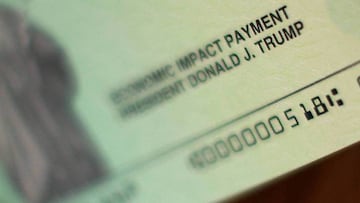Stimulus check US: CARES vs HEROES vs $4,000 travel tax credit
Many Americans are eager for further financial relief to follow the CARES Act coronavirus stimulus payment, with the HEROES Act check and a travel tax credit two major proposals put forward.

CARES Act stimulus check
Under the CARES Act, a $2.2-trillion coronavirus relief package signed into law in March, eligible Americans have been receiving stimulus checks of up to $1,200 to help them cope with the financial effects of a pandemic that has caused unemployment to soar in the United States. Since April - a month that saw the US jobless rate surge to 14.7% - the Internal Revenue Service has sent out nearly $267 billion in Economic Impact Payments, according to its most recent figures.
The scheme has seen individuals earning less than $75,000 a year receive a one-off payment of $1,200, with $2,400 given to joint tax filers whose combined income is under $150,000. Individuals on up to $99,000 and couples on up to $198,000 have received a steadily decreasing amount, while households have also been able to claim an extra $500 per dependent under 17.
See also:
- Second stimulus check: what would a back-to-work bonus be?
- Millions at risk of missing out on stimulus check
HEROES Act stimulus check
Several polls carried out in April showed that the CARES Act stimulus checks would only tide many Americans over for so long, with a 64% of respondents to MarketWatch survey saying their payment would cover them for less than three months. With this in mind, the HEROES Act, a $3tn package passed by the House of Representatives in May, proposed a second round of Economic Impact Payments with broader eligibility and an increased amount per dependent.
While individuals on under $75,000 and couples on less than $150,000 would again get $1,200 and $2,400, respectively, the HEROES Act would also give households $1,200 each for up to three dependents, including those over the age of 16. Furthermore, the bill would not only include immigrants without a Social Security number - a group who were not eligible for the first check - but would also retroactively change the terms of the CARES Act to get them that payment too.
However, the HEROES Act must get through the Senate before being signed into law, and it has met with fierce resistance from Republicans in the upper chamber, who have balked at the overall spend that it proposes, and described the bill as "dead on arrival". According to Axios, Senate Majority Leader Mitch McConnell has told the White House that a limit of $1tn needs to be placed on any future stimulus package.
See also:
$4,000 travel tax credit
In an interview with Scripps on Monday, Donald Trump appeared to confirm plans for another batch of stimulus checks as part of "very generous" relief legislation, but it is in fact unclear from his conversation with the reporter Joe St George whether he was indeed referring to a second Economic Impact Payment, or was actually talking about the stimulus package as a whole.
Although it is not the first time the president has offered Americans hope they will be getting another stimulus payment, Forbes warns that his administration looks to be prioritising “stimulating the economy through job growth” over sending out direct financial aid to people in the US. “This includes a focus on manufacturing jobs, infrastructure spending, a payroll tax credit, a return-to-work bonus and other related incentives,” the specialist financial publication says.
"I think we need less rescue and more incentive," concurs White House economic adviser Larry Kudlow, who has spoken of his support for measures such as tax rebates and a return-to-work bonus. (However, it should also be noted that Kudlow told Fox Business this week that a second round of stimulus checks remains "on the table".)
One potential incentive scheme is a travel tax credit, which was floated by Trump at a White House roundtable in May and would bid to boost the country’s hard-hit tourism industry by allowing Americans to claim back money spent on domestic travel. According to the US Travel Association, such a credit should apply to expenses on things such as “meals, lodging, recreation, transportation, amusement or entertainment, business meetings or events, and gasoline”.
What is a tax credit?
Unlike a stimulus check, a tax credit is not a direct cash injection, but is instead a sum of money that taxpayers can deduct from the amount of tax they owe a country's inland revenue. The scheme is often used to incentivise certain economic activities, such as paying for child care and saving towards retirement.
Arizona senator proposes American TRIP Act
This week, Arizona Senator Martha McSally has taken up the idea of a travel tax credit and tabled the American TRIP Act, which would enable individuals to get back expenses incurred in 2020, 2021 and 2022 from their tax bills, up to a maximum of $4,000 for individuals and $8,000 for joint filers. Whereas the tax credit outlined by the US Travel Association would only apply to 50% of travel expenses, the TRIP Act would allow people to recoup such costs in their entirety.
ICYMI: @SenMcSallyAZ introduced a new bill to provide a tax credit of up to $4,000 for domestic travel as well as providing funding for DMOs to promote travel. Learn more about the American TRIP Act ↓ https://t.co/J2w7NzG9xf
— U.S. Travel (@USTravel) June 24, 2020
"The tourism and hospitality industries were among the hardest hit sectors across the country and their revival is critical to our economic recovery," McSally said in a statement, adding: "My legislation will help boost domestic travel and jumpstart the comeback of our hotels, entertainment sectors, local tourism agencies [...]."
Related stories
If passed, the TRIP Act will "encourage Americans to safely get out of their homes and discover or rediscover Arizona along with the rest of the amazing destinations our country has to offer", McSally concluded.
See also:
Live coverage of the coronavirus pandemic
At the time of writing, the coronavirus pandemic had led to 2,381,369 cases and 121,979 deaths in the United States, which has been by far the world’s worst-affected country. You can follow live, America-focused Covid-19 news by reading our live US feed.

